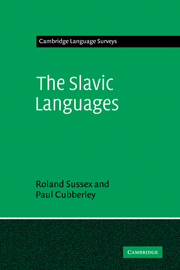Book contents
- Frontmatter
- Contents
- Preface
- Acknowledgments
- map
- 0 Introduction
- 1 Linguistic evolution, genetic affiliation and classification
- 2 Socio-historical evolution
- 3 Phonology
- 4 Morphophonology
- 5 Morphology: inflexion
- 6 Syntactic categories and morphosyntax
- 7 Sentence structure
- 8 Word formation
- 9 Lexis
- 10 Dialects
- 11 Sociolinguistic issues
- Appendix A: Abbreviations
- Appendix B: Orthography and transliteration
- Appendix C: Slavic linguistics: resources
- Bibliography
- Index
9 - Lexis
Published online by Cambridge University Press: 22 September 2009
- Frontmatter
- Contents
- Preface
- Acknowledgments
- map
- 0 Introduction
- 1 Linguistic evolution, genetic affiliation and classification
- 2 Socio-historical evolution
- 3 Phonology
- 4 Morphophonology
- 5 Morphology: inflexion
- 6 Syntactic categories and morphosyntax
- 7 Sentence structure
- 8 Word formation
- 9 Lexis
- 10 Dialects
- 11 Sociolinguistic issues
- Appendix A: Abbreviations
- Appendix B: Orthography and transliteration
- Appendix C: Slavic linguistics: resources
- Bibliography
- Index
Summary
Patterns of lexis
‘From the point of view of lexis, all the [Slavic] languages are very like each other’ (Skalička, 1966: 23). It is true that the lexicons of the Slavic languages differ less systematically than their phonology or morphology, which are responsible for some of the most widespread differentiating features in the Slavic lexicons, like pleophony in East Slavic (Rus molokó ‘milk’; cf. Cz mléko, Blg mléko; 3.2.1.7) or differing word-formation patterns (chapter 8). Nonetheless, there are major patterns in the Slavic lexicons which show different compositions and histories, and which affect the degree to which the languages are mutually comprehensible. Slavic is also much less overlaid by foreign lexical borrowing than is English, where some estimates of non-indigenous lexis ‘are well over 80%’ (Stockwell and Minkova, 2001: 2).
Lexicology is well developed as a named field of descriptive Slavic linguistics, and the lexicons of the Slavic languages have been intensively studied and described over the last two centuries. Much of the research has been related, directly or indirectly, to the question of the definition and delimitation of national languages, together with their formation and culture (chapter 2), including lexical enrichment and purification: the Slavs’ prescriptive approach to the regulation of their national languages is shown in their approach to the lexicon (together with grammar, orthoepy and orthography) in language planning and policy (11.2.3).
- Type
- Chapter
- Information
- The Slavic Languages , pp. 472 - 498Publisher: Cambridge University PressPrint publication year: 2006

